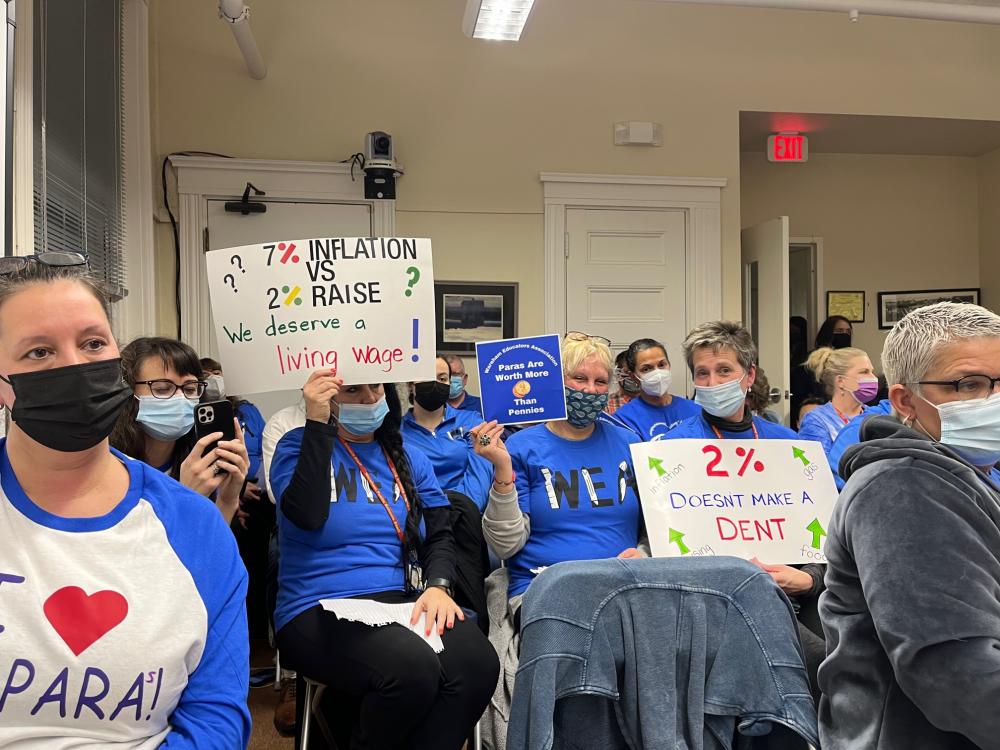Crowd turns out to support paraprofesionals’ bid for better pay at Wareham Schools
A crowd of paraprofessionals, teachers, students and supporters filled the hallway outside the Feb. 17 School Committee meeting, advocating for higher pay for the workers who they say are integral to the schools’ success.
Paraprofessionals, sometimes called teachers’ aides, work to support special education students both in general and special education classrooms.
But supporters say paraprofessionals go far beyond their written job descriptions, offering social, emotional and academic support to students — whether they are directly assigned to work with those students or not.
The paraprofessionals’ unit of the Wareham Education Association is working to negotiate a new contract, and they’re being offered a 2 percent raise. That’s a smaller raise than has been offered to teachers and other bargaining groups within the school district, according to one speaker.
The School Committee heard about 30 minutes of comment on the issue, but Chair Joyce Bacchiocchi said members were unable to respond as negotiations are ongoing.
Currently, a first-year paraprofessional earns $23,013, according to the union’s current contract, which will expire in August. A paraprofessional in their fifth year in the district earns $24,909.
One paraprofessional at the meeting said she is a single person and still needs to work a second job to make ends meet. Another, a single mother of two children, said she relies on Medicaid and food stamps.
Michelle Houghton, a special education teacher, said that a raise for paraprofessionals would be a money-saving move for the district. She said her classroom is able to teach children who might otherwise have to attend pricey out-of-district schools in large part due to the assistance of paraprofessionals.
“Without our paras, our programs wouldn’t be as successful,” Houghton said. She said that the cost of sending a single child out of the district is equivalent to two paraprofessionals’ salaries.
Kevin England, a Wareham High graduate, said that paraprofessionals were integral to his success as an autistic student.
“In addition to helping me succeed academically, many of these paraprofessionals would help with any struggles I may have had,” England said.
He said the paraprofessionals were good listeners and advice-givers, and he said their work helped him graduate among the top 10 students in his class. He now attends Bristol Community College.
“I don’t think that I would have gone this far without the help of amazing paraprofessionals,” England said, before shouting out some of the paraprofessionals who helped him over the years.
Macy Doyle, a second grade teacher, said the paraprofessionals she works with are integral to her students’ success. One paraprofessional, she said, spends unpaid personal time before school to help two students with their reading homework because the students’ parents don’t speak English.
Jennifer Feeney, a paraprofessional at the high school, described her job as “building a bridge between the student and the teacher” by making sure students have the support they need to turn their attention to learning. She said that having a cohesive and consistent staff is vital for her students’ success.
“One way to end the high rate of turnover in these challenging positions is to compensate paraprofessionals at a rate that is at least consistent with the cost of living,” Feeney said, noting that the country is experiencing record inflation. She said paraprofessionals at the high school are currently attending extra training after school — unpaid.
Nicole Roberge, a special educator who spoke holding her son on her hip, said that it would be impossible to write down a full description of the work paraprofessionals do — and an attempt to do so would mean no one would apply.
“My fear is that if we don’t value them enough, then they will leave,” Roberge said, her voice cracking with tears as she spoke. “They can go to a job that will pay more, but they won’t be fulfilled. They stay because they’re fulfilled by working with the kids, but fulfillment only goes so far.”
She said she’s worried the district would lose “the best people in our schools,” and noted that paraprofessionals who are exhausted and stressed about money aren’t able to do their best for students.
Indiana Troupe, a high school student, read a letter co-signed by 37 of his peers.
“Paraprofessionals make a difference in students’ lives every day, and not just their own students,” Troupe said. “We are proud of being students at Wareham, we are proud of our school and the environment in our building and our community, and losing valuable members of our school community because of inadequate pay increases is a way to alienate our students and many others from the school.
“We need to focus not just on keeping students in Wareham, but also staff members who are just as valuable to our community,” Troupe said.















